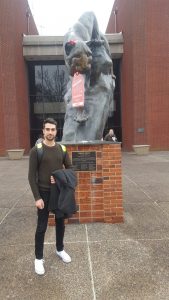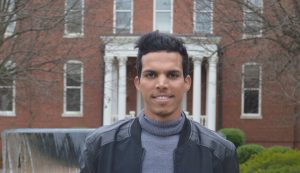Global UGRAD and the Love of Language
February 21st marked International Mother Language Day. In celebration of the diversity of languages, two Global UGRAD participants share their passion for learning and speaking multiple languages. Their interest in the study of language has propelled them to continue learning new words, cultures, and ways of thinking about the world around them. We hope you will enjoy reading their perspectives on the value and importance of being multi-lingual.
Ahmad Masalha, Israel, Southern Illinois University – Edwardsville

Since my early childhood, I have been exposed to different languages. My family spoke Arabic, but, living in Israel, they spoke Hebrew as well. In addition, my aunt who lived abroad would communicate with us in English. Thus, I grew up speaking Arabic, Hebrew, and English, which I speak today in the fluency of a mother tongue. I discovered my love for languages during my first semester in university, and since then I’ve taught myself an additional four languages: German, Persian, Aramaic, and French; the last one I’m still learning. In the future, I plan to expand this list even more.
When I was asked what the most important invention in human history is, I immediately answered: languages. Languages aren’t just a medium of communication. They are the manifestation of our thoughts and awareness; the manifestation of human consciousness itself, which is why I think languages and language learning are important. Languages are the key to understanding cultures: they reflect how the people of that cultured evolved, how they think or thought in the past, and what their values are. For example: in English, when going to sleep, one would say “good night,” while in Arabic the equivalent expression is “May the morning find you well.” When I’m learning a new language, I’m not only learning new words and grammar, but also I’m learning a new way of thinking and a new perspective to look at things. This improves my personality, enhances my creativity, and helps me relate more to people of different backgrounds and cultures.
An Arabic proverb says that if you speak to someone in a foreign language that he learned, then you’re speaking to his mind; but if you speak to him in his mother tongue, then you’re speaking to his heart. In other words, learning languages is an effective way to bring different people and cultures together, and thanks to Global UGRAD, I got to experience that proverb first hand. In this program, I befriended people from different cultures, and got to practice my seven languages with them (after all, languages need constant practice). Speaking with native speakers of some of these languages was a great test to my knowledge in them, and that provided me with a unique opportunity to enhance it even more. Global UGRAD can enrich its participants with many experiences, but this lingual and cultural exchange, in my opinion, is definitely one of the most important things it adds to one’s self.
El Khalil Telba, Mauritania, Georgia College and State University

Learning languages is more accessible than most people think, and that was something I discovered while studying the five languages that I speak now. My learning process was entertaining and efficient due to the motivation that I have to learn more about the world, to leave an impact, and change the situation of my country and the world. I usually pick languages that have a lot in common with the ones I speak already, for example, the Romance or Germanic languages. I start by memorizing the most used sentences in my targeted language and using them in conversations without worrying about making mistakes. I focus more on phrases than grammatical intricacies because it is hard and will affect my motivation and consistency which are crucial to this process. However, once I reach a conversational level, I pay more attention to grammar because I want to use the language for academic studies and interpretation. I speak Arabic and French fluently along with English, which I began to teach myself and would later become my major at my university. Then I decided to start learning German and Spanish which I am studying now at Georgia College with some of the best teachers I have ever had. I am surrounded by people that I can practice and use the language with as well as have access to other resources that were not available back home. I recently started taking some Italian and Portuguese courses online which will get me closer to my goal of speaking ten languages fluently and becoming an interpreter. The world is suffering from several problems due to miscommunication, and I believe that interpretation and communication will help unite the world, share a mutual understanding, and build bridges between cultures. As an effect, learning new languages should be a must for everyone so that we can all participate in making the world a better place.